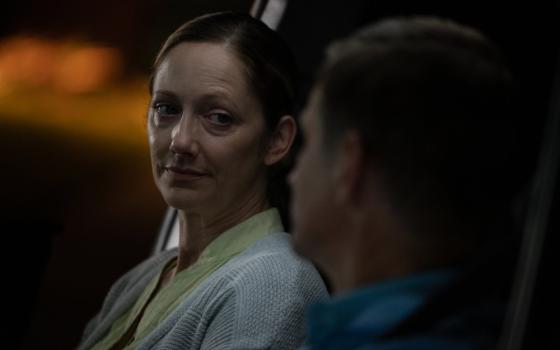President George Bush has managed to stir the waters again on the role of the United States in Iraq by comparing it to Vietnam. Bush is now saying we should not have left Vietnam so early, despite the fact that Vietnamese themselves are arguing that we should have left much earlier than we did. (See: Bush's invocation of Vietnam War pullout to defend his Iraq strategy rankles Vietnamese.)
The broadening of the discussion to Vietnam can only complicate the present debate even more, but it does at least give us a chance to look back into our own recent history for some clues about how to proceed at this time.
But there is more to the story than the headlines. At the same time Bush reopened the Vietnam debate, curiously enough, I got a letter from an Iraqi participant in past activities of the Woman's Global Peace Initiative, asking us to share this letter with as many people as possible. That makes this column longer than most. The length of the agony in Iraq must surely warrant it.
So, read it if you can. Imagine that you got it from someone you know and ask what it is saying to you? Who's right? President Bush? The Vietnamese who are speaking out against his analysis? This young woman who is living in the United States?
Most of all, ask what the letter says that daily news bulletins cannot begin to report:
Dear friends: Iraqis, Americans, Canadians. Dear all,
Yesterday I went with a group of Iraqi and American friends to see a documentary movie about Iraq "No End in Sight." To tell you the truth, I was very concerned and my mood changed even before reaching the cinema. A month ago I started to avoid movies or anything related to Iraq ... because I feel I am tired and helpless and it [had] started to affect me in a way that nothing has done before. I started to think that I have to take care of myself ... I didn't die in Falluja or Ramadi and I certainly don't want to die in Boston!!
Anyway, the movie started. I didn't want to miss a second of it, so when a group of people simply sat in front of me I moved to a far place at the corner to see it [without interruption]. By the way, one of the effects I realized about myself after 2003, [is that] I became very tough and sometimes rude!
You can't imagine, my friends, [but] every time I see the pictures of beloved Baghdad with all the fires, explosions, piles of garbage everywhere -- every time I see Baghdad with pictures of devastated people -- I just can't, I just can't take it into my mind and heart calmly! By now, I should be used to these pictures. By now I should feel OK. Not OK, but it should be common for me. BUT I CANT!
I don't know what the movie wanted to say. To us Iraqis [there was] NOTHING NEW. Not in terms of information. Not in terms of behind-the-scene plans or [in terms of] what went wrong.
But what struck me [is] that the Americans, the producers, didn't feel ashamed or try to transfer the message that "Well, we are sorry, this is not what we wanted to do."
And why? Ahh, because simply a group of people -- not more than four, "the seniors," were doing whatever they liked to destroy a whole country. A whole country with almost 27 million husbands, brothers, lovers, girls, boys, children was destroyed in one way or another simply because a group of CONS, were ruling the White house??!!!
Frankly, this dark truth stroke my heart: Where is America's very pioneering and unique democratic system? Its rule of law? Its checks and balances? Its Congress? Its rights? Its freedom for people?
I realized that OHHH what a fool I was to think that there is on earth a system that may contain [or control] tyranny or greed!! ...
The movie ended with bloody pictures of Iraqis killed, arrested, kicked in their own houses. Pride and dignity is no longer there for a man in front of his wife and children. And in most cases, the son is taken in front of his mother, torturing her heart. Iraqis, [some]one comes to rule you. Knows how to torture and kill you. The striking CDs of Saddam's dogs killing and torturing people are repeated with more professional hands. And to add more to it, by foreigners!
I was thinking, if an Iraqi woman married in 1980 and saw her husband going to the front during the 1980s [Iran-Iraq] war and then bore all the suffering of embargo, [after the first Gulf War] selling her jewelry and household [goods] to feed her family, then ended up worrying every single moment about her son or daughter, I don't know what kind of personality this woman will have or will she be considered [to have] lived a life?!!
So I was thinking: Those bad guys made us lose our country and now [has] anything changed to bring it back? After what the Republicans did to Iraq, the Democrats come to say, "Well, we did enough and the Iraqis should continue. We will not stay there forever helping Iraqis!!!!!!!!!!!!!"
I don't know: How many schools have been built? How many roads or [how much] civil infrastructure has been built? How many universities have been developed. Or, before all that, do the Iraqis have at least electricity or water to [allow anyone] to say WE DID ENOUGH for IRAQIS! I don't ask [anyone] to do things for us, but when you exclude us from our country, when you bring us people like the current government, when you open our borders for terrorists, when you ban our military and fail to convene one, I AM SORRY, I don't see you did a thing!
Now I feel [there] is really no end in sight because neither Republicans nor Democrats are concerned with Iraq as a country or [as] people. [That] is somehow understandable from a political view. But what I can't understand [is] how come things turned to be, "We did enough and Iraqis should do the rest. We cut [off] legs and hands [but] "Come on, Iraqis, move. Why are you so static!!!!"
I don't deny it. I learned a lot from working with the Americans. I developed a lot. Now I am privileged to study at Fletcher but it just can't be weighed in this way. It can't be compared to what I lost or what my Fulbright friends have lost, too.
I just want my American friends [to] understand: If I who [am] considered to be privileged in one way or another -- at least none of my brothers has been killed and I have not been kidnapped. At least when we were threatened, we moved from our Baghdad house into a house in Erbil so we didn't suffer like other big families who moved from their big houses into tents in camps -- if I with this considerable easy life think and feel like this, can anyone tell me what a girl who is just as ambitious as I am and may be 10 times more clever than me and hopes to continue studying and pursue her life, what [does] this girl's life look like when she can't have a cold glass of water or fresh air in this summer? And above all, this year her parents may ban her from her college for security concerns. Can anyone tell me what/how she will feel about America?
[Or to] put it more clearly, can you tell me how a young man grown up in this hostile very harsh life caused by the Americans will feel and how he will react against YOU?? If you are fighting terrorists I think it is reasonable not to create new ones and feed them with such anger.
Educated people will differentiate governments from people or can have access to good people in your country. Unfortunately not all Iraqis are educated given the embargo years "which were forced by the Americans, too!" And given the chaos after 2003 as you banned almost a million militarized men and banned the main part of my society, the young, to wait to have something good out of Iraq? I doubt it, my friends. I doubt and fear the consequences for both your country and mine.
A brilliant friend of mine "Mohammed," has forwarded this song to me today and I wanted to share it with you, since it is in English. I hope it would make sense for you. http://www.youtube.com/watch?v=mprsqx2VT8M&mode=related&search
I know Iraqis also have [made] mistakes against their country ... I know there are so many things that Iraqis should do by themselves ... but today I want to write about WHO CAUSED both sides' mistakes!
Shahla
Click on the link. Listen to the song. Then -- wherever you stand on the spectrum between "We had to invade Iraq" and "We should never have invaded Iraq" -- ask yourself: What has this war really accomplished?
From where I stand, it's clear that war is not the answer to much of anything. So why are we there?


